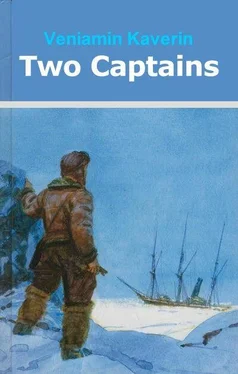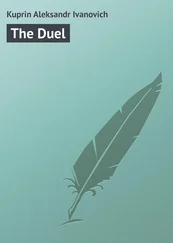"Well, get your things together. Just a change of underwear. Accompany the prisoner, will you," he said to the house manager.
"Your documents, Captain."
"It's all nonsense, Nikolai Ivanovich!" Romashov was saying in a loud voice in the next room, where he was packing his knapsack. "I'll be back in a few days. It's that same stupid old business about the offal. Remember me telling you about it-the offal from Khvoinaya?" ' Vyshimirsky's teeth chattered again. It was obvious that he had never heard about that offal before.
"Sanya, I hope you find her in Yaroslavl," Romashov said louder.
"Tell her-"
Standing in the hall, I saw him drop the knapsack and stand for a while with closed eyes.
"Never mind," he muttered.
"Excuse me, may I ask you for a glass of water," the man in the cap said to Vyshimirsky.
Vyshimirsky gave it to him. Now we all stood in the hall-Romashov with his knapsack on his back, the house manager, who had not said a word throughout, and a bewildered Vyshimirsky with the
empty glass in his hand. For a minute or so all were silent. Then the young man pushed open the door.
"Goodbye, excuse me for disturbing you." And with a polite gesture he motioned Romashov forward.
Probably, if I had the time, I would have tried to discover some deep meaning in the fact that fate, working through a member of the Moscow C.I.D., has so abruptly interrupted my conversation with Romashov. But the Yaroslavl train was leaving at 8.20 and in the time left to me I had to:
(a) present myself to Slepushkin and complete all the personnel formalities besides, and that might take a good hour and a half;
(b) drop in at the Rewards Department-while still at M-v I had received notice that the award of my second Order of the Red Banner had been endorsed and I could receive the document at the People's Commissariat;
(c) get something to eat on the journey-nearly everything I had
brought with me from M-v I had left with a fellow-airman of the Baltic Fleet in Leningrad;
(d) book my ticket, but this did not worry me much, as I would have gone without one.
What's more, I had to write to the military prosecutor about Romashov.
All this appeared to me absolutely necessary, that is, my life during the four or five hours before my train was due to leave, was to be rilled with these particular cares. But what I should have really done was simply to go back to Valya Zhukov, who was a few minutes' walk away, and then-who knows?-I might have found time to give some thought to that jumble of truth and lies with which Romashov had tried to put himself right with me.
I even paused in Arbat Square, in two minds whether to drop in for a minute on Valya or not. Instead, I went into a barber shop-I had to get shaved and change my collar before reporting to the Hydrographical Department, where one rear-admiral was going to introduce me to another.
At five o'clock sharp I presented myself to Slepushkin, and at six.
I was enlisted in the H.D. personnel for posting to the Far North at the disposal of R. Two or three years ago these laconic, formal words would have conjured up a distant scene of wild rolling hills lit up by the timid sun of a first Arctic day, but just now what with excitement and all these cares on my mind, I mechanically thrust the document into my pocket and walked out, thinking of my omission in not having asked R. to get in touch with Yaroslavl by military telegraph line.
I shall not dwell on the hour and a half that I lost in the Rewards Department and my other errands. But I must describe this last memorable encounter I had in Moscow.
Very tired, I went down into the Metro at Okhotny Ryad. It was the close of the working day, and although in the summer of 1942 there was still plenty of room in Moscow's Metro, there was a crowd at the top of escalator. As I peered into the faces of the Muscovites coming up on the moving belt towards me, it suddenly occurred to me that throughout that busy, tiring day I had seen nothing of Moscow. I noticed from afar a heavily-built man in a thick cap and an overcoat with broad square shoulders floating up towards me, waxing larger as he waited with an air of lofty toleration for that noisy machine to carry him to the top.
It was Nikolai Antonich.
Had he recognised me? I doubt it. Even if he had, of what interest to him was a little captain in a shabby tunic, with an ugly kitbag from which a hunk of bread stuck out?
His somnolent, imperious glance slid over my face incuriously.
____________________
PART NINE
TO FIND AND NOT TO YIELD
Chapter one
THIS IS NOT THE END YET
At the hotel in Yaroslavl there was a telegram waiting for me: "Leave immediately for Archangel. Lopatin." It was from the Hydro-graphical Department. But why not from Slepushkin with whom I had arranged that I would continue my search for Katya in the event of my not finding her in Yaroslavl? Who was this Lopatin? And why immediately? Why Archangel? True, Archangel was still the main base for any hydrological work along the Northern Sea Route. But hadn't R. told me that we were to meet at Polarnoye, where his plans would have to be endorsed by the Commander-in-Chief of the Northern Fleet?
All this was cleared up, and very soon too. But at the moment, there in Yaroslavl, in that squalid little hotel, where I raised the blue paper blind and read and reread the telegram, I felt nothing but vexation at this muddle and uncertainty, which seemed in some way to threaten Katya and deprive me of the hope of seeing her again soon.
I now had a short journey facing me-a mere thousand kilometres northward of Katya…
This is what I learnt when, straight from the train, I presented myself at the HQ of the White Sea Naval Flotilla: Lopatin, whom I had been cursing all the way, was Personnel Chief of the Hydro-graphical Department. Only now did I recollect having heard the name at the People's Commissariat. There had been no muddle in this telegram. The day I left Moscow events had occurred in the Far North which caused Rear-Admiral R. to leave urgently, at night, for Archangel, and the same night a wire had been sent to me. There was nothing now for either R. or me to do at Polarnoye, as the officer commanding the fleet had himself gone to Archangel. His meeting with R. had taken place the day before. Evidently, the plan for that "most interesting job" had been approved, because immediately after this meeting R. flew out to Dickson. He must have been in a great hurry, or else decided he could manage without me, otherwise he would have left instructions for me at Flotilla HQ.
"You're late, Captain," The Flotilla Personnel Chief said to me. He was a genial, grey-headed man with side whiskers, who resembled an old sailor of the period of Sevastopol's first defence. "What am I to do with you now? We can't send you chasing after him."
He ordered me to report again in a few days time.
But how Archangel had changed, how unlike itself, while still itself, it had become.
American sailors strolled about the streets in their little caps, bell-bottomed trousers and woollen jumpers, fitting close round the waist and falling loosely over the trousers. British sailors, with the initials "H.M.S." on their caps, were somewhat more reserved in their manner, but they, too, had that easy-going air about them which distinguished them so strongly from our own sailors and struck me as strange. One encountered Black sailors at every step. Chinese, washing shirts in the Northern Dvina, right under the quay, and laying them out in the sun among the rocks, chattered loudly in their softly guttural tongue.
And the Dvina, so spacious, so Russian, that it seemed there could be no other river like it in the world, bore its brimming waters onward. Motor launches, cleaving the sparkling wave as with a knife, passed in one direction, towards the cargo port.
Читать дальше












